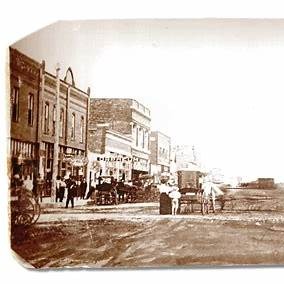Woodward Shoutouts
Archives
Voices of Woodward: Local Historians Illuminate the Town's Legacy
SIGN UP FOR OUR NEWSLETTER
Voices of Woodward: Local Historians Illuminate the Town's Legacy |
Exploring the rich tapestry of Woodward's past through its dedicated storytellers |
History books often provide dates and events, but in Woodward, Oklahoma, the true essence of the town's past is preserved by its local historians.
These individuals walk the same streets where pioneers once settled, where the railroad brought new opportunities, and where a devastating tornado reshaped the community's spirit.
From the Plains Indians & Pioneers Museum to passionate oral storytellers, these voices keep Woodward's identity alive.
Meet the Storytellers
Museum Curators: At the Plains Indians & Pioneers Museum, curators preserve artifacts, oral traditions, and rotating exhibits that bring frontier life and Native heritage into focus.
Community Historians: Longtime residents, retired teachers, and local authors keep stories alive in living rooms, coffee shops, and civic gatherings.
Oklahoma Historical Society Affiliates: Researchers and archivists enrich these local memories with statewide context, weaving Woodward into the larger Oklahoma narrative.
Key Stories They Tell
The Frontier Crossroads
"Woodward was born where cattle trails met the iron rails," says one local historian.
Established in 1887 with the Southern Kansas Railway, Woodward quickly became a shipping hub for Texas cattle drives.
The dusty frontier town transformed into a bustling economic anchor in northwest Oklahoma.
Land Runs & A Town Divided
The Cherokee Outlet Land Run of 1893 drew thousands.
Two rival towns—East Woodward (nicknamed "Denver") and government-backed Woodward—sprang up and eventually merged, leaving Main Street's trademark curve as evidence of those competing beginnings.
Native Roots and Forgotten Stories
Historians emphasize that before pioneers arrived, Kiowa, Comanche, Cheyenne, and Arapaho tribes traveled and lived across this land.
Their stories—often overlooked—remain vital to Woodward's cultural identity.
The 1947 Tornado: A Defining Tragedy
On April 9, 1947, a massive F5 tornado tore through Woodward, killing more than 100 residents.
"The storm destroyed buildings, but it didn't destroy Woodward's spirit. That storm is still in our DNA," reflects a museum docent.
The disaster became both a scar and a story of resilience—one still retold by every generation.
Did You Know?
The first bank in Woodward opened in 1894, built by land run settlers.
Charles Lindbergh once made an emergency landing near Woodward in 1927.
The town still hosts one of Oklahoma's oldest rodeos, dating back to 1929.
Why These Stories Matter Today
Woodward's local historians aren't just recording the past—they are shaping how the community sees itself.
For younger generations, these stories ground them in place.
For visitors, they add depth beyond attractions.
For the community at large, they preserve resilience, innovation, and pride.
Closing Call
Next time you're in Woodward, visit the Plains Indians & Pioneers Museum or attend a local history talk.
Listen.
The voices of Woodward aren't just telling stories—they're ensuring the town's legacy lives on. |

